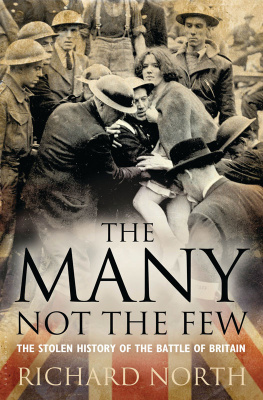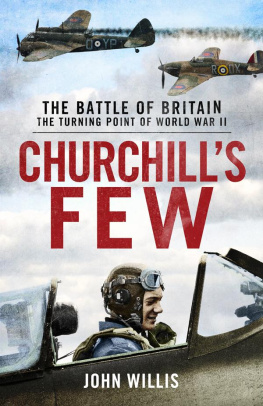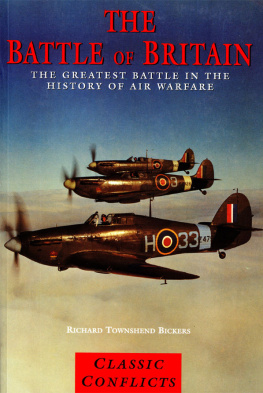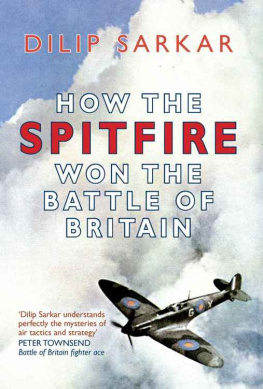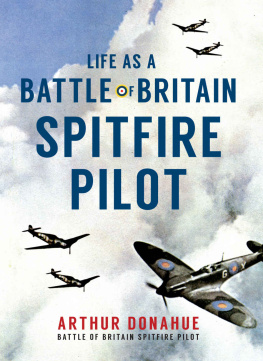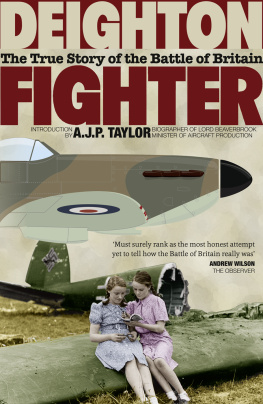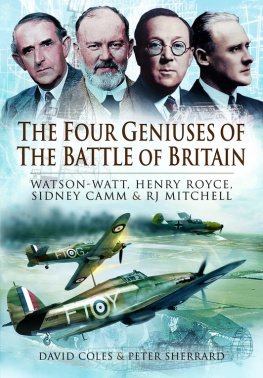The Many not the Few
The Stolen History of the Battle of Britain
Richard North
Never in the field of human conflict was so much owed by so many to so few.
Winston Churchill, Their Finest Hour. 20 August 1940
The searchlights are in position, the guns are ready, the peoples army of volunteers is ready they are the ones who are really fighting this war
Quentin Reynolds, London can take it. 16 October 1940
Copyright 2012 by Richard North
All rights reserved. No part of this book may be used or reproduced in any manner whatsoever without written permission from the publisher except in the case of brief quotations embodied in critical articles or reviews. For information address Bloomsbury USA, 175 Fifth Avenue, New York, NY 10010.
Published by Bloomsbury USA, New York
LIBRARY OF CONGRESS CATALOGING-IN-PUBLICATION DATA HAS BEEN APPLIED FOR.
ISBN: 978-1-62040-101-9
First U.S. Edition 2013
This electronic edition published in March 2013
1 3 5 7 9 10 8 6 4 2
Typeset by Fakenham Prepress Solutions, Fakenham, Norfolk NR21 8NN
www.bloomsbury.com
Contents
Theres one going down in flames! Somebodys hit a German and hes coming down with a long streak coming down completely out of control a long streak of smoke.
Charles Gardner, BBC Journalist, 14 July 1940
On Sunday 14 July 1940, the BBC decided to cover the action. With aerial battles visible to cliff-top watchers along the south coast of England, its reporter Charles Gardner joined the crowds to witness German attempts to stop an eleven-ship convoy being run through the Straits of Dover.
At close to eleven in the morning, a Dornier twin-engined medium bomber escorted by ten Messerschmitt 109 fighters made the first attack. Then, in the early afternoon, a force of about 120 enemy aircraft collected behind Calais and approached the convoy. At around three in the afternoon, as the sky reverberated to the drone of aircraft, Gardner began to make his now famous recording:
The Germans are dive-bombing a convoy out to sea! There are one, two, three, four, five, six, seven German dive-bombers! Junkers Eighty-Sevens! Theres one going down on its target now Bomb! No! He missed the ships it hasnt hit a single ship. There are about ten ships in the convoy, but he hasnt hit a single one and There! You can hear our anti-aircraft going at them now. There are one, two, three, four, five, six there are about ten German machines dive-bombing the British convoy, which is just out to sea in the Channel.
Despite the large numbers of German aircraft, there were just three single-seater Hurricane fighters thrown into the fray. Heavily outnumbered and outclassed by the superior Me 109s, they belonged to Red Section of No. 615 Squadron (Sqn). As they went into action, the excited Gardner described the fighting:
I cant see anything. No! We thought he had got a German one at the top then, but now the British fighters are coming up! Here they come. The Germans are coming in an absolute steep dive, and you can see their bombs actually leave the machines and come into the water. You can hear our guns going like anything now. I am looking round now I can hear machine gun fire, but I cant see our Spitfires, they must be somewhere there. Oh! Heres one coming down!
Like most journalists of his day, Gardner had not acquired any expertise in aircraft recognition. He had that in common with many Royal Air Force (RAF) fighter pilots, some of whom flying Spitfires in early September 1939 had shot down two Hurricanes. Others were later to claim Heinkel 113 fighters as trophies a type that did not exist. Gardner saw Spitfires when only Hurricanes were in action. As he watched the spectacle, he joyously exclaimed:
Theres one going down in flames! Somebodys hit a German and hes coming down with a long streak coming down completely out of control a long streak of smoke. And now a mans baled out by parachute! The pilots baled out by parachute! Hes a Junkers Eighty-Seven and hes going slap into the sea. And there he goes SMASH! A terrific column of water and there was a Junkers Eight-Seven. Only one man got out by parachute, so presumably there was only a crew of one in it!
Fortunately for Gardners immediate reputation, these comments were for radio. A Hurricane had now become a Junkers Eighty-Seven and it was this from which a mortally wounded Pilot Officer M. R. Mudie had just bailed out the crew of one. Mudie was eventually picked up by the Royal Navy and hastily transferred to Dover Hospital, where he died the following day.
What was not explored at the time was how much of the narrative was factually wrong. For instance, Gardner had been confident that the ships had escaped unscathed. They had not. The collier SS Island Queen had been badly damaged. Taken in tow by the trawler Kingston Alalite, she sank before reaching harbour, with three crewmen lost. Less than two miles south of Dover Pier, the SS Mons had been damaged. The Norwegian steamer Balder took a hit and caught fire. The flames were extinguished but she had to be towed into Dover Harbour. The escort destroyer HMS Vanessa had her main engines disabled and she too had to be towed into port. Yet, to all of this drama, Gardner had been oblivious.
However, despite its manifest and egregious errors, the piece has been rebroadcast many times and it is still celebrated by the BBC on its website with no reference to or acknowledgement of its errors. That, in many ways, typifies the Battle of Britain experience. The account of the battle is flawed, yet it is repeated again and again, without any acknowledgement of its errors. It has become obscured by myths.
Part of this book is an exploration of these myths. Mainly, it is a fundamental re-evaluation of the Battle of Britain, addressing the simple question: who won? The traditional answer is the few, that gallant band of Fighter Command pilots in their Spitfires and Hurricanes, led by Air Chief Marshal Sir Hugh Dowding, the man who should not have been there. By some strange stroke of fate, he had been due to retire on 14 July 1940, but had been asked to stay on by the then Chief of the Air Staff, Air Chief Marshal Sir Cyril Newall. The man with a nickname of Stuffy, a man with many enemies who would have been pleased to see him go, was now assured a place in history.
Desperately outnumbered, the few fought off the Nazi hordes in their Messerschmitt fighters, their Dorniers, Heinkels and Stukas. As to the essence of the myth, in the summer of 1940 Britain stood alone against the dark forces of Nazi Germany, prostrate after the fall of France and the miracle of Dunkirk. All that stood between it and invasion was Fighter Command. In a series of battles, the gallant few stopped the German air force establishing air superiority. The turning point came on 15 September 1940, when in an epic battle, the Luftwaffe was sent packing, a victory which caused the invasion to be postponed and then cancelled. The fighter pilots had saved the nation, Europe and the entire free world.
One myth was immortalized by the famous Low cartoon of 14 June, on the fall of France. It depicted a defiant soldier on a rocky shore surrounded by tumultuous waves, shaking his fist at the encroaching Nazi bomber fleet, voicing Churchills sentiment: Very well, alone! But we were not alone, the point made by a Fougasse cartoon in Punch magazine on 17 July. It showed two British soldiers sitting, overlooking the white cliffs of Dover. One is saying So our poor old Empire is alone in the world. The other replies Aye, so we are the whole 500 million of us.
Next page
